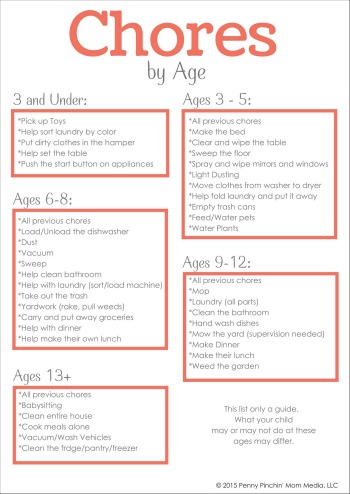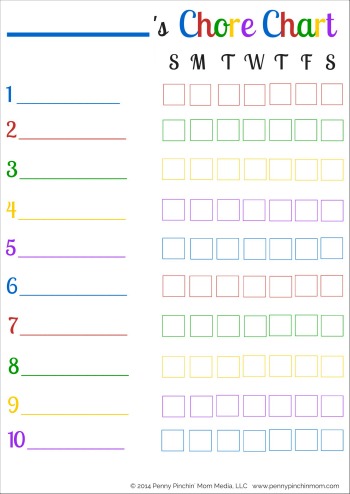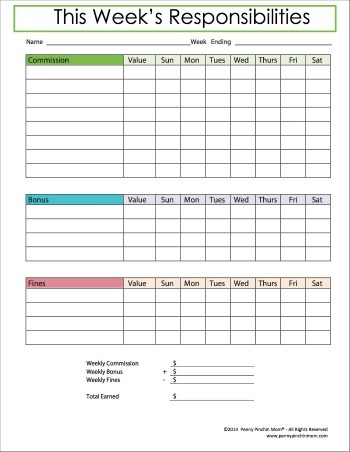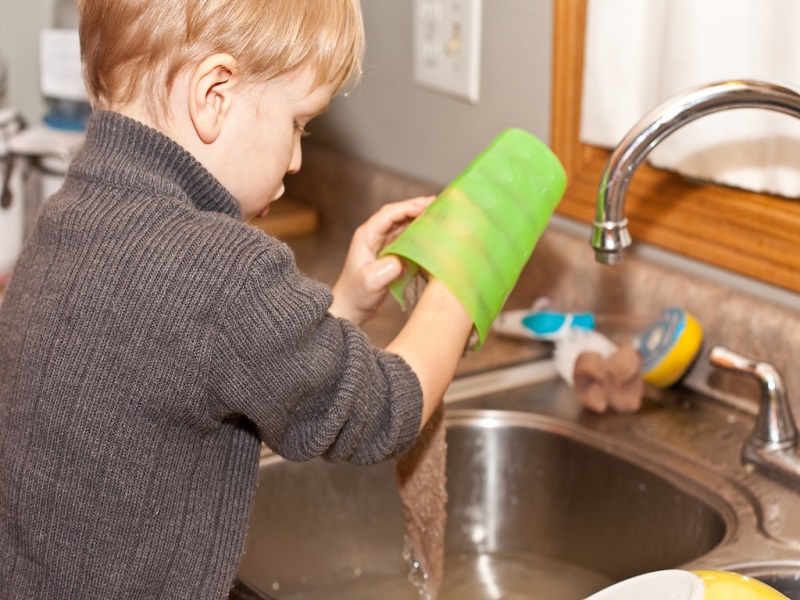via Penny Pinchin: Learn how to make a chore chart for kids, no matter their age. There are chores for kids of all ages — even as young as age 3! A simple chore chart can help your child remember what he or she must do every day.
Do you struggle to get your kids to do their chores — or even to figure out WHAT chores they need to do? You are not alone. And then, when you do figure out the chores, getting your kids to do them — with a smile on their face — is another obstacle all together.
As Moms and Dads, part of what we need to teach our children is how to contribute to the running of our household, which in turn can help them to become contributing members of society. One way we do this by assigning chores for kids via a chore chart. They help the house run smoother and they actually get the opportunity to take ownership of a task.
That alone can boost self-esteem and help them with their development. I know my kids get a lot of satisfaction when they complete a task.
Other ideas for chore charts for kids:
- The Ticket Reward & Fine Method
- When Should I Start My Child on an Allowance?
- Paying Your Kids For Chores with a Kid Safe Debit Card (You Completely Control)
- How Toy Jail Teaches Responsibility
video
TIPS FOR USING A CHORE CHART FOR KIDS
There are several things that you need to keep in mind when it creating and using a chore chart with your kids. The following tips will help you achieve chore chart success with your own children.
1. KEEP IT AGE APPROPRIATE
With three kids of varying ages, the chores we require differ for each of them. Our oldest has more chores such as doing laundry whereas we keep it simple for our youngest. Each of their chore charts identify what they need to do each week.
You will want to print this simple age appropriate chores list and keep it handy. It is a guide to help parents determine which chores children can do at every age. This way, you can find new chores to add to your child’s chore list.
This is a great way to help your children learn how to complete these tasks. However, remember that you can’t expect perfection. Just expect for them to try their best. This chart is a great way for them to learn how to take care of themselves and their own home.
You may also try a task listed and find that your child is not yet ready to try that. Just change what you do the following week. Conversely, you may feel your child can take care of items listed in an age group which is older. That too is fine. This is a guide to help you find those items which work for both you and your child.
2. LET THE KIDS HELP
You know the chores your kids can handle, so have them help creating their own chore chart. Look over the chore list and have them decide which ones they will do this week.
You will not want to allow them to select everything (they will pick the simplest ones). But, when he or she feels a part of the decision making process, there is more motivation to do every chore.
3. MAKE THE CHORE CHART VISIBLE
It is important that your child can see the chore chart and keep track of what he or she has done for the week. This can be done on a white board on your refrigerator or even a piece of paper tacked to a bulletin board.
Remind your child to update their chore list every day. I find that when my kids can physically check a box or a line to show they did something, they do much better at keeping track of what they have done and those items they have yet to complete.
Below you will find two different printable chore charts. One is very basic and is great for younger children, while the other is more detailed and perfect for older children.
Whether you use one of the charts below or a completely different chore chart, make sure it is visible and easy for your child to see and follow.
If your children are a bit older, you can use the Responsibility Chart instead. This chart has spaces for the regular chores (Commissions), additional tasks (Bonuses) and areas where they tend to get into trouble (fines). You tally up the income and take away the fines each week and they earn the difference. This chart is created to teach them, well, responsibility in the workplace.
They learn that if they do not complete the work, they do not get paid. They also learn that if they do the wrong thing (like fight or disrespect Mom and Dad), they have a fine. We compare this to speeding or being reckless and causing damage to things. It works well for our kids and they sure hate it when we say the word “FINE”!
If you want even more detailed information into how we use the Responsibility Chart in our home, you can read about that here — Teaching Our Children Financial Responsibility.
4. DETERMINE THE REWARD OR INCENTIVE
Rewards will vary greatly from family to family. For some parents, the chores are required just as part of being a part of the family. They are expected to contribute and there is no reward attached to it. For others, it is simply financial. They pay per chore or per week as the chore charts are completed.
The rewards may be incentive based such as sleepovers, extra time on the game system, etc. The beauty of any good system is that you can make it work for your family. You know your kids and your family structure, so you know what you expect and will give in return. A chore chart can serve as incentive and reminder for your kids (and quite possibly, even for you)!
5. DETERMINE THE PUNISHMENTS
If your child doesn’t do all of their chores, there must be a consequence. Of course, there will times when there circumstance outside of our control, which contribute to chores not being completed.
However, many times, the chores are not completed because your child simply forgot or decided not to do it. When this happens, you need to take away those rewards, such as a play date or the special treat he or she was to get the following day.
When your child forgets, help them get their chores done, but don’t give them a free pass. They still have to learn there are consequences in life when we don’t do what we are suppose to do.
6. LEAD BY EXAMPLE
Children are sponges and they watch everything you do. If you slack off and don’t do your daily chores, your children see this. Make sure you are responsible and doing what you need to every day. Your kids will be more motivated to do their daily chores when they see mom and dad doing the same.
7. MAKE SURE YOU STILL HAVE FUN
All work and no fun, makes Jack a dull boy. You’ve heard that, right? There is so much truth here! Add fun to the chores such as making it a game to toss laundry into the laundry basket.
In addition, allow time for the kids to have fun. After all, they are kids. Aim to strike a balance between the things they need to do and what let’s them enjoy being a kid.
8. DON’T OVERBURDEN YOUR KIDS
It’s important that children have chores to do. But, you don’t want them to be overwhelmed. When this happens, it may be time to change the chores or remove some of them completely.
During the school year, there may be sports and homework every night. During this time, you may need to scale back on the number or types of chores he or she needs to do.
9. WATCH OVER THEM
Kids need reminders and supervision when doing their work. Even my older kids need me to remind them about what they need to do. Gently guide them to get their daily chores completed every day before bed time.
10. TEACH THEM
You can’t expect your children to know what to do right away. It will take time to teach them the right way to dust and to do the laundry. Keep your expectations low at first and raise them as your child learns how to do every chore on his or her chore chart.
When learning how to make a chore chart for your kids, keep these tips in mind. Chore charts should teach and not cause burden or stress to anyone in the family.













